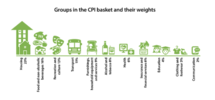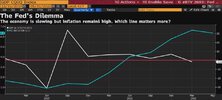- Joined
- 20 December 2021
- Posts
- 218
- Reactions
- 500
The RBA’s preferred measure of inflation, the trimmed mean, beat market estimates. This keeps the central bank’s forecasts of 7% inflation this year intact, and warrants the need for higher interest rates.Inflation in OZ to 6.1 Percent.
And little liklihood it will drop any time soon.
So, do we get25, 50, 75 or 100 BPS from the RBA??
Mick
However, the softer-than-expected headline CPI print seems to have erased bets on a more aggressive 75bps move by the RBA for the time being.
Should be interesting to see how market speculation develops leading up to Tuesday’s meeting, and what impact tonight’s Fed decision has as well.




